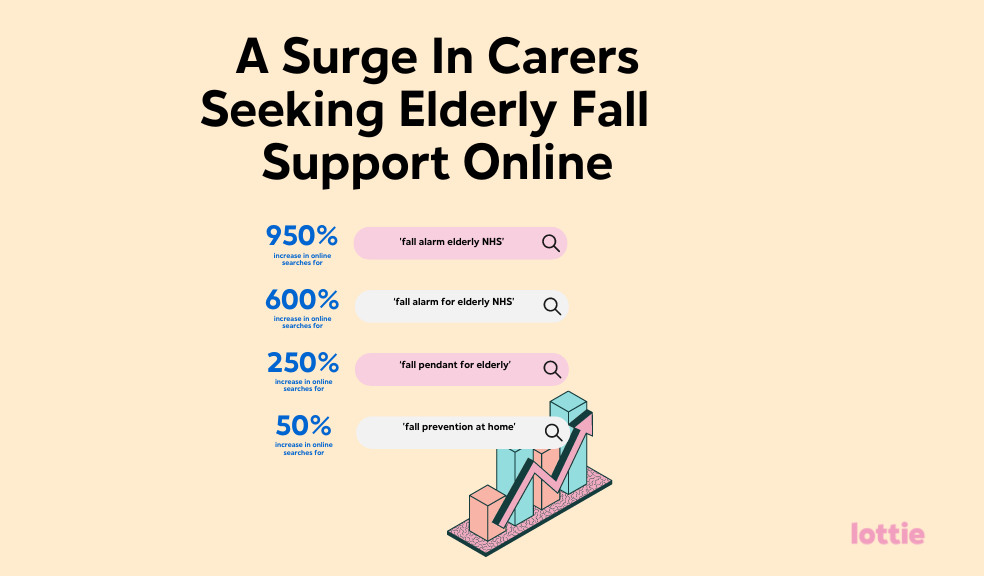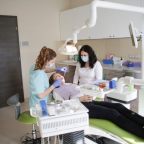
Online Searches For Fall Prevention Surge As The Met Office Issues Winter Weather Warning
With the Met office issuing an amber weather warning across the UK this week, we all need to take extra care to stay safe whilst out and about. Extreme weather poses a risk to anyone’s health, but those most vulnerable – including the older generations – could be severely impacted.
Fall prevention and good balance is becoming increasingly important for older adults - especially with the winter months fast-approaching. NHS research has found elderly falls are on the rise - with the number of older adults (over 65) needing hospital treatment for falls increasing by 15% over the last 10 years.
New research by Lottie (a later living marketplace) has found a substantial increase in older adults turning to Google for fall prevention support to cope with the extreme weather change over the last 12 months:
- 950% increase in online searches for ‘fall alarm elderly NHS’
- 600% increase in online searches for ‘fall alarm for elderly NHS’’
- 250% increase in online searches for ‘fall pendant for elderly’
- 50% increase in online searches for ‘fall prevention at home’
Will Donnelly, Care Expert and Co-Founder at Lottie, shares: “The risk of falling increases as we get older and can be exacerbated in the winter months - though most falls don’t cause serious injuries, they can leave you feeling unsettled and less confident to move around independently.
With the Met office issuing an amber weather alert, it’s important we’re able to support our elderly loved ones and neighbours during the winter months. From keeping their homes clutter free, to encouraging them to eat well, there are lots of things we can do to help our elderly loved ones stay steady on their feet and prevent any falls.”
8 Steps To Lower Your Loved One’s Risk Of Falls - According to Lottie’s Will Donnelly:
- Keep their home clutter-free
One of the easiest ways to prevent falls at home is by removing home hazards. Try to keep living spaces free from any mess or clutter - this could be something as simple as removing any old newspapers or magazines.
Make sure to check each room in your home. Look out for loose carpets, rugs or floorboards that may be sticking up and could be a tripping hazard. Slip resistant backing can be added to flooring and rugs to prevent the risk of any falls.
- Brighten their living space
A bright environment can make it easier to spot any tripping hazards and prevent falls. Placing lamps within easy reach and in living spaces your loved one uses often is an easy way to keep their home well lit - especially in the winter months.
You can also remind them to switch lights on before entering a different room or walking up or down stairs to prevent falls at home.
- Encourage the use of walking aids
Rails and handle bars can help older adults to be safe and independent at home by supporting them with everyday tasks such as getting up and down stairs, using the toilet and washing.
A walking stick or walking aid can help your loved one to stay steady on their feet as they move around - both at home and outside. Check with a doctor or nurse that your loved ones walking aid is set to the right height and any wheels roll smoothly.
- Know their medicines
Some medicines can impact balance or cause you to feel dizzy or faint. If your loved one experiences side effects like these after taking any medication, it’s important they speak to their doctor – they may need to check the dose or look at alternatives.
- Help them to stay active
As we age our muscle mass, bone strength and overall balance decreases - however physical activity promotes good balance and strength and can prevent the risk of falls.
From dancing, chair yoga and stretches, there are lots of gentle exercises older adults can do from the comfort of their own home to stay active. You can encourage them to get moving by getting active together.
- Support them to eat well
It’s important that your loved one eats well and drinks plenty of fluids throughout the day - this will help to keep their energy up and prevent the risk of falls.
Keep an eye on their appetite and encourage them to eat 3 meals a day. If they find it hard to eat 3 main meals a day, nutritious snacks such as dairy (cheese, milk and eggs), oily fish high in omega-3 and fruits and vegetables are all good alternatives to maintaining a balanced diet.
- Monitor their eyesight
Our eyesight decreases with age, so it's important to keep an eye on your loved ones eyesight and help them to get their eyes tested regularly - at least every 2 years.
Eye tests can detect any vision problems early, before they cause you to lose your balance and coordination.
- Offer practical support
As the temperatures drop and surfaces become slippery, you can support your loved one through the winter months by offering practical support with everyday tasks. From getting their weekly shop and keeping them stocked up on supplies. To taking them to social events and appointments, you can keep your loved one safe and well.













